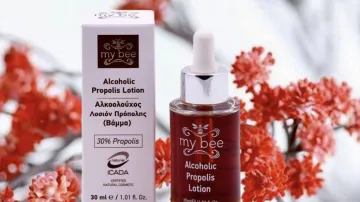Published at Friday, December 8, 2023 11:14 AM on the My bee organization's page
THE PROPOLIS
The word propolis originates from Greek: «pro» = in front and «polis» = city. The meaning “in front of the city” suits well the protecting role of propolis for the bee colony. The Greek world propolis means also to glue and describes also the role of propolis to cement openings of the bee hive. Another name of propolis is bee glue.
Propolis was already known in ancient Egypt, where it was probably used as an adhesive. Propolis was mentioned by the Greek philosopher Aristotle. It was referred to a substance which the bees smeared at the hive entrance and used as cure for bruises and sores.
The Roman scholar Plinius, postulated that it originates in the buds of different trees like willow, poplar, elm, reed and other plants. He knew of the use of propolis as glue in the hive and about its medicinal properties and described them in his 35 volumes Natural History. He says “Current physicians use propolis as a medicine because it extracts stings and all substances embedded in the flesh, reduces swelling, softens indurations, soothes pain of sinews and heals sores when it appears hopeless for them to mend.
The Arabs knew probably also about propolis. Doctor Avicenna speaks of two different kinds of wax: clean wax and black wax. The propolis. He says: “by its strong smell it makes you sneeze” and “has the characteristics to eliminating the spikes of the bolts and the stakes”. In Europe it is mentioned in the herbal literatures. Other healers in many centuries that followed also praised the use of the propolis for healing.
PROPERTIES
- The antimicrobial activity of propolis is by far the most important biological property of propolis, which has deserved the highest scientific interest. In spite of the big compositional differences of the different propolis types, they all have antimicrobial activity, fungicide, antiviral and anti-parasitic effects of against harmful and pathogen organisms. The antibacterial effect of propolis is bactericidal, that means bacteria-killing, by inhibiting their mobility.
- Propolis acts against a number of parasites. Thus, it could act as a protective agent against intestinal parasites.
- An antioxidant is a molecule capable of slowing or preventing the oxidation of other molecules and so to prevent such changes. The antioxidant effect correlates roughly with the anti-inflammatory and hepatic protective activity.
- All propolis types have immune-stimulating However the active substances of the various types of propolis are different.
- The antitumor a



